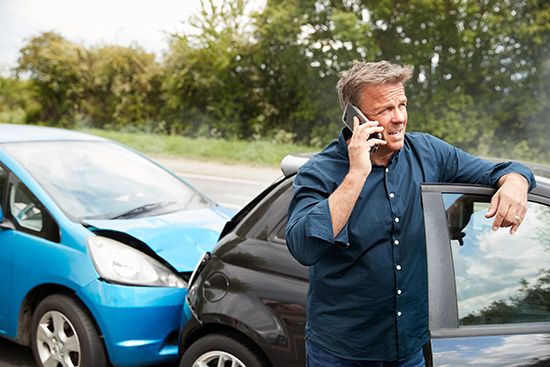Auto Insurance
 The insurance companies we represent provide a wide range of auto insurance products at a fair price. Your price gets even better if you qualify for any of our available discounts.
The insurance companies we represent provide a wide range of auto insurance products at a fair price. Your price gets even better if you qualify for any of our available discounts.
When applying for auto insurance, you're usually asked whether you want collision and/or comprehensive coverage, how high you want your deductible to be, what liability limits you want, and whether you want any types of optional coverage. We can help you understand what these terms mean and how much coverage is right for you. Choosing the appropriate level of auto insurance coverage depends on several factors, including assets you must protect (liability coverage), the value of your vehicle (collision and comprehensive), the amount of money you can afford to pay out-of-pocket (deductibles), and your tolerance for risk.
Coverage options:
Collision and Comprehensive (other than collision) coverages
Collision and Comprehensive (other than collision) coverages pay for damage to your automobile. You can purchase either or both of these coverages for each vehicle you own. If you have an auto loan you may be required to purchase both.
- Collision coverage insures you against damage to your vehicle caused during an accident.
- Comprehensive (other than collision) coverage insures you against all other physical damage to your car caused by such events as fire, theft, flood, and vandalism.
Collision and comprehensive (other than collision) coverage usually include a deductible, which can range from $100 to $1,000. If your car is damaged, the insurance company pays only for the damage above the deductible you selected. The higher the deductible, the lower the premium.
Liability coverage
Liability coverage pays for injuries you cause to other people and damage you cause to other people's property when you are at fault in an automobile accident.
Medical Payments coverage
Medical Payments coverage pays medical expenses (up to a specified dollar limit) for you and passengers of your car who are injured in an automobile accident, no matter who is at fault. If you and your passengers have health insurance, you may not need this coverage.
Personal Injury Protection
Some states require Personal Injury Protection, which is also known as No-Fault coverage. This coverage pays for things like medical and rehabilitative expenses, replacement services, and funeral expenses. It also pays for loss of income if you are injured in an auto accident and are unable to work.
Uninsured/Underinsured Motorist coverage
This coverage pays if you are injured by a person who is completely uninsured or doesn't have enough liability insurance to cover your injuries. It also covers you if you are in an accident with a hit-and-run driver.
Optional coverage
Optional or special coverage includes extras such as towing, rental reimbursement, and roadside assistance. None of these coverages are required.
Homeowners Insurance
 The coverage you have depends upon the type of policy you have. Unlike auto insurance, where the policies are pretty much the same, homeowner's policies can be quite different, depending on the "form" number. The most common types of homeowner policies are:
The coverage you have depends upon the type of policy you have. Unlike auto insurance, where the policies are pretty much the same, homeowner's policies can be quite different, depending on the "form" number. The most common types of homeowner policies are:
- HO1 Basic or Standard policy
- HO2 Broad form
- HO3 Special (also called Deluxe, All Risk)
- HO4 Renters policy
- HO6 Condo policy
- HO8 Older Home policy
All homeowner policies are "package" policies. You get a group of coverages packaged into your policy for one overall premium. They include coverage on your building, your contents (furniture, clothing, etc.) and liability insurance in case you are sued, under the same policy. The property coverage is shown under Section 1, while the liability coverage is described under Section 2.
There is no better way to understand your homeowner's policy than to read it! We suggest you pull out your policy and find the parts to your policy that correspond to the following explanations:
A typical policy consists of three things:
- The Declarations Page - declares who, what and how much you are insuring, along with the date your coverage starts and the premium.
- The Policy Booklet - printed pages that contain the details of coverages and exclusions.
- Endorsements - separate pages, usually with endorsement numbers, that change (or endorse) specific parts of the policy.
Sometimes you are only given the original policy once in the beginning. Then on renewal, to cut down expenses, you are just sent the dec. page (declaration page) with the bill. It's a good idea to save the original policies should you ever need to refer to them.
More Detailed Information
The HO1 policy is very limited in coverage and is not being sold by most companies.
The HO2 policy covers the basic perils of fire, lightning, explosion, smoke, hail, aircraft, riot, glass breakage, theft, and damage caused by vehicles. It also adds additional coverage to broaden your policy. Those perils include damage caused by rupture of your water or heating pipes, falling objects (such as trees), the collapse of the building, limited electrical damage to appliances and others.
The HO3 policy is, by far, the most commonly sold policy. It covers everything the HO2 policy covers and more. Instead of listing the perils that are covered these policies cover all damage to the building except what is excluded. The usual exclusions are wear and tear, termites, rotting, the collapse of the septic tank, flood, war, earthquake, and a few others. Some HO3 policies are referred to as "Deluxe", "Special", "All Risk" policies depending upon the company.
Most policies cover your contents or belongings only for the perils named in an HO2 policy so wear and tear and normal breakage are not covered for your furniture and personal belongings.
Be careful! To keep the cost of insurance down, your policy probably has limited coverage on certain items. Typical limits include:
- Cash - $200
- Jewelry - $1,000
- Firearms - $2,500
- Silverware - $2,500
Check your policy carefully. If you see you don't have enough coverage, find out how much it would cost to increase those limits or to buy special coverage.
Optional Coverage
In addition to special coverage for jewelry, silverware, and furs, you can purchase specific coverage for such possessions as stamp or coin collections, fine arts, camera equipment, collectibles, watercraft, and musical instruments, just to name a few.
Combined Coverage for Better Benefits.
Insurance specialists at Dow Insurance serve to help you coordinate an insurance program that determines the best coverage options for your needs – for benefits and quality discounts that help you save.
What does this mean for you? By combining home and auto policies, you may be eligible to receive discounts on both your home & auto insurance premiums.
Illinois Personal Umbrella Insurance
Umbrella insurance is there to protect you if you are liable for something big. Similar to an umbrella, it is there to fill in coverage gaps that you may have from your other insurance policies.
For example, if you're in an auto accident and need to cover replacement and medical costs, umbrella insurance can help in these extra costs. Instead of just having your normal auto insurance coverage, umbrella insurance gives you the additional coverage you may need.
Umbrella insurance can assist in the claim and payment processes by covering costs when all other insurance is exhausted. This makes the handling of claims and payments a much easier process
Illinois Renters Insurance
You may be wondering why it's necessary to have renters insurance. Rental properties, particularly apartments, can be risky once they involve potential claims. You share a building with plenty of individuals where fires, theft, and water damage are sometimes frequent. There are many potential risks and your property is in danger. The items you own are valuable and you should shield them from a loss. Besides, renters insurance in most cases is extremely inexpensive.
What will renters insurance protect against?
We know the primary concerns with renting a home or apartment, and renters insurance protects you from a range of threats and dangers that could occur with a rented unit. Upon purchase of renters insurance, you're covering yourself against several things like fire, lightning, vehicles, smoke, vandalism, theft, water damage, electrical damage and several other problems.
Selecting the right amount of renters insurance
We can facilitate that your valuables are insured. Once you decide the amount of coverage you need, we can tailor a package to fit your renter's insurance needs.
Coverages for renters insurance includes personal property coverage in case of fire, theft or damage and liability coverage for risk of accident at your rental, as well as other coverage options.
